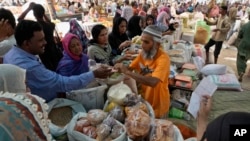Cash-strapped Pakistan still does not have a date to close a key agreement with the International Monetary Fund (IMF) that will allow the release of a $1.1 billion bailout package. The IMF says the debt continues to be sustainable, however the situation has grown more pressing as the country's central bank says it only has enough foreign exchange reserves to finance another four weeks of imports.
Meanwhile, Pakistan Federal Minister of Finance Ishaq Dar tweeted Friday that the United Arab Emirates has confirmed to the IMF $1 billion in financial support to Pakistan, and the state bank is collecting the documentation needed to take the deposit from UAE authorities.
Minister of State for Finance Aisha Ghaus Pasha told VOA in Islamabad on Thursday that Pakistan is hoping the IMF will soon get confirmation from its external financing partners to allow the funds to be released.
After Dar's tweet Friday, it seems as if Pakistan is closer to unlocking the IMF funds, but no date is in sight for a staff-level agreement.
Also Friday, Jihad Azour, director of the Middle East and Central Asia department at the IMF, told reporters that the country needs to manage double-digit inflation and maintain monetary policy to promote sustainable growth.
"Pakistan is at a critical juncture today and a decisive action by the country is required to reform and stabilize the economy," Azour said.
The IMF this week forecast 27% inflation for Pakistan and slashed the impoverished nation's growth outlook to just 0.5% in the coming year. The country has been reeling from high fuel and commodity prices. In March, the cost of food was estimated at almost 50% higher than a year before.
That has made some economists worry the country's debt problem ultimately will hurt consumers. Uzair Younus, director of the Pakistan Initiative at the Washington-based think tank the Atlantic Council, told VOA that, "given the ongoing crisis, it is likely, ultimately Pakistan will require debt restructuring, which would unleash even more pain on ordinary citizens."
Younus said, "Sooner or later the country will either need a robust reform roadmap that convinces folks to lend to the country again or go down the path of debt restructuring."
This week, Managing Director of the International Monetary Fund Kristalina Georgieva said the fund is working hard to ensure that Pakistan has the policy framework so that its debt does not become unsustainable.
Pakistan is among a group of countries that international credit agencies have warned could be vulnerable to default this year, as their economies try to recover from the economic fallout of the COVID-19 pandemic.
The London-based Fitch Ratings group last month said there are now a record five Fitch-rated sovereigns currently in default: Belarus, Lebanon, Ghana, Sri Lanka and Zambia.
Ali Furqan contributed to this report. This story originated in VOA's Urdu Service.











